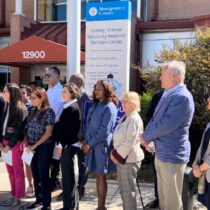
Montgomery County Executive Marc Elrich has come out swinging against the County Council’s recent zoning text amendment. The amendment allows construction of duplexes, triplexes, townhouses and apartments throughout the county along public transportation corridors, major roads and town centers.
Eight councilmembers voted to support a zoning change they said would bring middle -and more affordable – housing to residential areas.
“This proposal is about more housing options for more people so that our teachers, firefighters, police officers, and nurses can afford to live in our community,” Councilmember Andrew Friedson explained previously. “The status quo clearly isn’t working for workers, for our economic competitiveness, or for fulfilling our values as an inclusive, welcoming county.”
Elrich Disagrees with Current Plan
Elrich, however, who is running for an At Large seat on the County Council, said the zoning update does not include affordable housing mandates and will hurt renters. Recently he has been on local media railing against the plan.
On Wednesday during his weekly media opportunity, Elrich said there already is space for more housing units. Zoning changes aren’t needed, he said. According to Elrich, there is enough open area for 85,000 new units in the county’s master plan.
“The problem is sluggish growth in jobs,” resulting in fewer requests for housing. “What we lack is enough demand,” he said.
He pointed to Wheaton, where zoning allows more high-rise buildings. “If it had been zoned more reasonably, more would have been done,” Elrich said. Instead, only one high rise has been built.
Housing Expert Discourages Zoning Approach
He invited two faculty members from Vanderbilt Law School to address the zoning issues. They acknowledged they don’t know Montgomery County well and could not speak to specific housing issues here.
“There is no real question that there is a housing crisis in this country,” said Christopher Serkin. Housing costs are burdening people all over the country, he said.
However, he said, zoning disincentivizes construction of more housing. Stopping zoning can “unlock the market,” he noted, calling a strong focus on zoning changes “just too narrow.”
“Zoning is a piece of the puzzle, but only a piece,” Serkin said.
Should Government Build Housing?
Founding Director, Vanderbilt Policy Accelerator, Ganesh Sitaraman cited several ways to ease the housing crisis. Governments can invest more in the housing sector and take more of an active approach, he said. He recommended allowing more modular housing, which costs less than other housing.
Sitaraman also suggested government produce housing, taking a smaller profit than developers, thereby reducing costs.
Another suggestion he made was to change tax policies so that vacant land and empty buildings are forced to pay taxes. That would stop developers from sitting on their land until they get higher prices for it, he said.
“Zoning should just be a part of the process,” he explained.
Council President Stewart Supports a Multi-Pronged Approach
County Council President Kate Stewart agreed zoning is just part of the process. Following Elrich’s press conference, Stewart spoke with MCM.
“My takeaway is zoning is not enough, and I would agree with that. One strategy is not going to add housing.” Stewart listed some of the other work the Council has done to alleviate the housing crisis here.
In a pilot project, the county has created incentives for developers to convert commercial properties into residential properties. It also has created exemptions to impact taxes, Stewart said.
Rent stabilization was enacted to help more people live in the county, she said. Also, there is a Housing Production Fund to allow for more affordable housing units.
“The County Council has had a multi-prong approach,” Stewart said.
Related Post
Council Votes to Allow Multiple Types of Housing Along Certain Areas


Comments are closed.